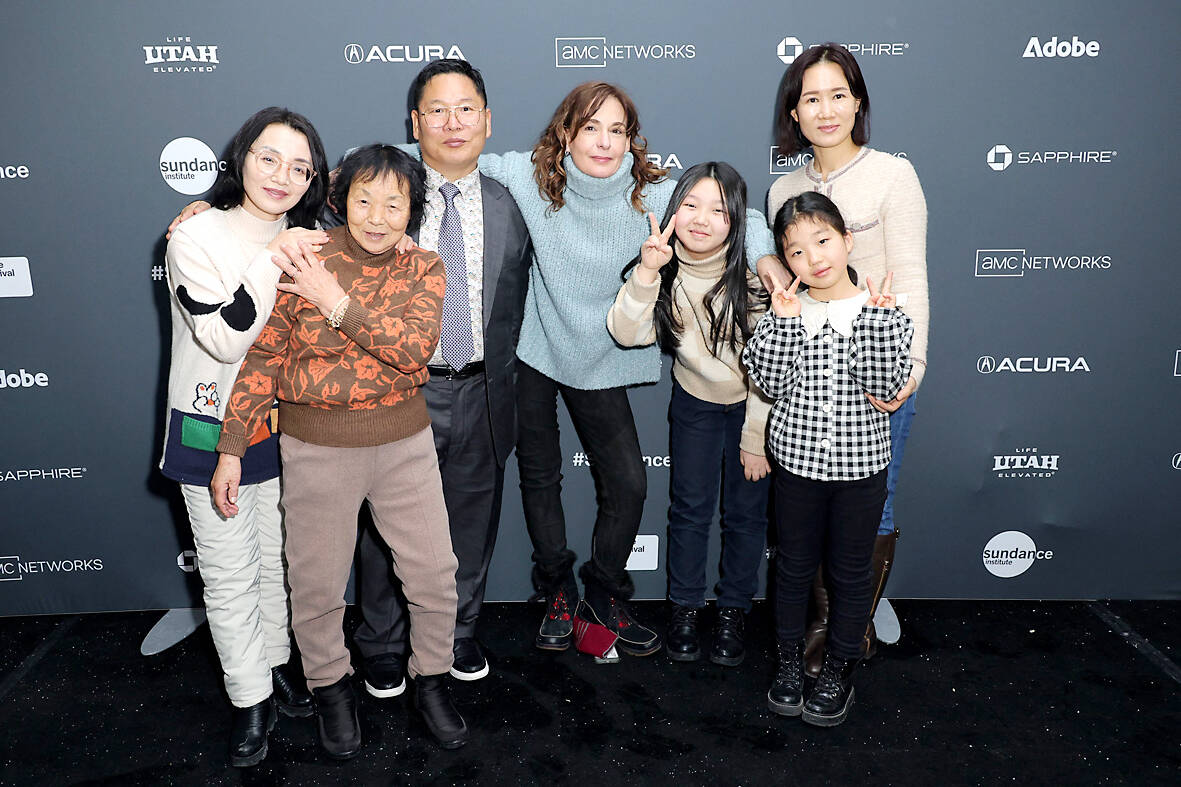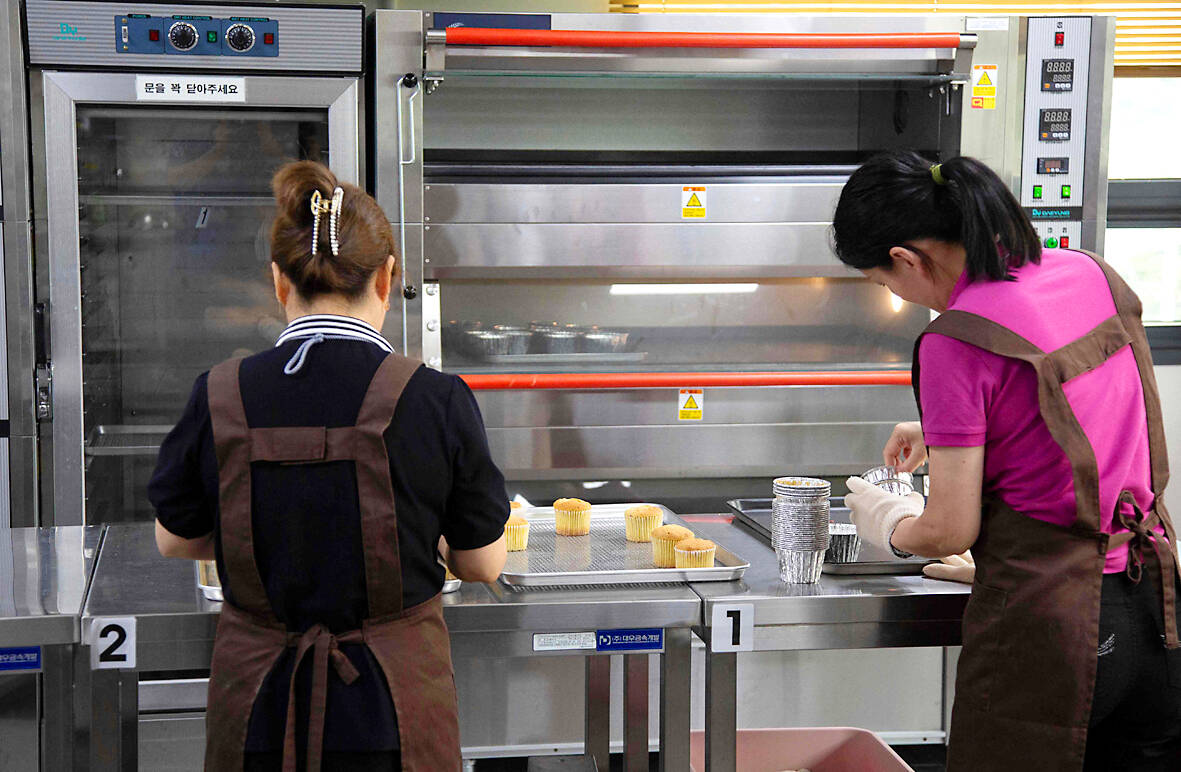Earning your subject’s trust is never easy for a documentary filmmaker — but it is even harder when they think you want to kill them.
That was the challenge faced by US director Madeleine Gavin, whose movie Beyond Utopia follows newly escaped North Korean defectors as they flee.
These include the Roh family and their elderly grandmother, who Gavin met just weeks after they bolted from their deeply repressive, reclusive homeland, and lifetimes of being fed propaganda.

Photo: AFP
“I’ll never forget the way that she would look at me,” Gavin said.
In their minds at the time, “Americans practically only exist to make North Koreans miserable and to kill and attack North Koreans.
“We aren’t even human beings ... that’s what they’ve been taught.”

Photo: AFP
Soon after the Rohs sneaked across the closely guarded border into China, a local farmer connected them to an “Underground Railroad” for defectors, run by a South Korean pastor whom Gavin happened to be filming.
The pastor arranged for the family to travel in secret through Communist-ruled China, Vietnam and Laos, braving police checkpoints and a treacherous jungle border crossing.
The movie uses footage shot in China by the pastor’s “brokers” before Gavin was able to meet and film them face-to-face herself in Southeast Asia.
At first, Gavin felt “a deep distrust and suspicion” from the family.
But despite the powerful brainwashing they had endured in North Korea, even the 80-year-old grandmother’s attitude quickly began to shift as she saw the outside world with her own eyes.
“She was having none of it ... She’d always been told that relative to the rest of the world, North Koreans are the luckiest people on Earth,” said Gavin.
“Then to be seeing a world where there are animals, and life, and toilets, even! We were a piece of that puzzle.”
When Gavin first set out to make her film — in US theaters yesterday — it focused on North Koreans already living for many years in South Korea.
On arrival in the south, many defectors attend a “resettlement facility” where they are taught about the rest of the world, the lies of Kim Jong Un’s brutal regime, and basic modern practices such as how to use an ATM.
But after meeting Pastor Kim Sung-eun, a prominent South Korean missionary involved in the underground network that brings escapees to the South, Gavin restructured the film to chronicle two families as they flee the north.
The documentary follows Soyeon Lee, a mother who has long since escaped North Korea, but is now trying to smuggle out the son she had to leave behind.
Tragedy strikes as he is captured in China, and sent back to North Korea to face punishment.
Filming the mother’s anguish “was really the most difficult thing,” Gavin said. “What she has gone through and continues to go through is the worst thing that anyone can go through.”
The other part of the film follows the Roh family as they embark on their harrowing, 3,000-mile overland journey toward Thailand, and freedom.
One slip-up could see them also repatriated to North Korea, lending the documentary a dramatic tension more associated with Hollywood thrillers.
But Gavin also set out to make something “experiential and present tense,” which gives a “voice to actual North Koreans,” whose country is mainly known to the rest of the world for its nuclear arsenal and terrifying politics.
Even as they flee, the Rohs express a complex mixture of emotions, from wonder and excitement, to anger at what they have long been deprived of, to shame.
Despite witnessing prosperity unthinkable back home, the grandmother “did not let up on the idea that Kim Jong Un was this incredible person, with the most difficult job before him,” Gavin said. “She had enormous guilt for leaving, and that anyone who defects is basically abandoning him, and how heartbreaking it is for him.”
Perhaps more powerful still is the family’s homesickness for the friends, neighbors, traditions and land they left behind.
The movie includes — and ends with — footage secretly shot inside North Korea and smuggled out by the pastor’s network, showing everything from the country’s barbaric gulags to the bleakness of everyday life.
“As Grandma says at the end of the film, ‘we’re so lucky, but it keeps me up at night thinking about the people who are still there,’” Gavin said.
“And so I wanted to leave the film remembering those people. Because those people are there, and they need us to help bring their voices forward.”

June 2 to June 8 Taiwan’s woodcutters believe that if they see even one speck of red in their cooked rice, no matter how small, an accident is going to happen. Peng Chin-tian (彭錦田) swears that this has proven to be true at every stop during his decades-long career in the logging industry. Along with mining, timber harvesting was once considered the most dangerous profession in Taiwan. Not only were mishaps common during all stages of processing, it was difficult to transport the injured to get medical treatment. Many died during the arduous journey. Peng recounts some of his accidents in

“Why does Taiwan identity decline?”a group of researchers lead by University of Nevada political scientist Austin Wang (王宏恩) asked in a recent paper. After all, it is not difficult to explain the rise in Taiwanese identity after the early 1990s. But no model predicted its decline during the 2016-2018 period, they say. After testing various alternative explanations, Wang et al argue that the fall-off in Taiwanese identity during that period is related to voter hedging based on the performance of the Democratic Progressive Party (DPP). Since the DPP is perceived as the guardian of Taiwan identity, when it performs well,

A short walk beneath the dense Amazon canopy, the forest abruptly opens up. Fallen logs are rotting, the trees grow sparser and the temperature rises in places sunlight hits the ground. This is what 24 years of severe drought looks like in the world’s largest rainforest. But this patch of degraded forest, about the size of a soccer field, is a scientific experiment. Launched in 2000 by Brazilian and British scientists, Esecaflor — short for “Forest Drought Study Project” in Portuguese — set out to simulate a future in which the changing climate could deplete the Amazon of rainfall. It is

The Taiwan People’s Party (TPP) on May 18 held a rally in Taichung to mark the anniversary of President William Lai’s (賴清德) inauguration on May 20. The title of the rally could be loosely translated to “May 18 recall fraudulent goods” (518退貨ㄌㄨㄚˋ!). Unlike in English, where the terms are the same, “recall” (退貨) in this context refers to product recalls due to damaged, defective or fraudulent merchandise, not the political recalls (罷免) currently dominating the headlines. I attended the rally to determine if the impression was correct that the TPP under party Chairman Huang Kuo-Chang (黃國昌) had little of a